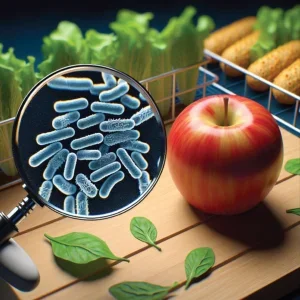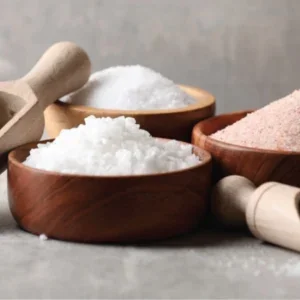
Food and drink: everyone has an opinion and a preference. Interest in food and how products are manufactured has intensified over the past decade with the advent of many new products coming to the market and the challenges resulting from health concerns.
While there is undoubtedly a trend for healthier and simpler foods, many products continue to be manufactured with complex ingredients. Consumers, understandably, want to be assured of the integrity of the product. There are a variety of international quality standards, including kosher certification, to assist consumers in clarifying the production standards used by manufacturers.
The concept of kosher food has been around for more than 3,000 years. While it is by all accounts a purely religious practice based on the teachings of the Torah – that is, the Bible given by God to Moses at Mount Sinai – incidentally or by design, it constituted the first ever set of regulations for food production, and it predates any other contemporary food regulations by millennia. In spite of its ancient origins, it has remained true to its source and, amazingly, it is still relevant today – in fact, not only is it still relevant, it is actually more popular and more widely appreciated now than at any time in its long history.
Rising demand: the opportunity
The number of kosher-certified products on supermarket shelves has been increasing year on year. According to Mintel, kosher was the leading claim on new products in North America in 2014 at 41%, even more than the seemingly ubiquitous gluten-free claim. This is quite a startling fact considering the complexity of some of these products in terms of their ingredients and manufacturing process.
The leading category for kosher product launches was bakery followed by snacks. Many of these products are afforded kosher certification through the underlying ingredients being already certified kosher. In the world of food manufacturing, the supply chain is a global village: ingredients are sourced from the world over.
The demand for kosher certification is driven by an increasingly intelligent consumer that recognises what the process involves. Certification requires an audit of the sources of the component ingredients, which demands transparency and traceability. Likewise, the manufacturer’s equipment used to process the ingredients is examined, inspecting issues such as shared equipment, processing aids and clean-down procedures, among others.
In Jewish law, all bugs and infestations are absolutely forbidden. This fact reinforces the view that the word ‘kosher’ is associated with the ideas of wellness and cleanliness. It is recognised within the food industry that auditing for kosher compliance, by a reputable kosher certification agency, is of the highest level; some other certifications may be obtained without an inspection.
Ingredients in the supply chain of a kosher-certified retail products must be either kosher approved or kosher certified. It is a global village in terms of suppliers of food ingredients. Companies like Dow Chemical use the world as their platform – nearly 70% of its inventory is imported, and of the 30% domestically produced, those ingredients too will have some imported part process ingredients or raw materials. Where companies seek to reduce the number of suppliers and manufacturers that can supply kosher and non-kosher, kosher ingredients will win out.
The greatest appeal
In Europe, kosher-certified products are on the rise. One in five manufacturers at Anuga, the world’s largest food fair, offer some kosher products. According to Innova, new products with a kosher claim increased in the year to 2013 by 38% and by 21% in 2014. With 85% of new products failing within two years, kosher certification may just give a competitive advantage or market entry point that enables it to succeed. Depending on the actual product, a kosher-certified one can have the widest consumer appeal to everyone, including vegetarians, Muslims and those with certain food intolerances. Wider consumer appeal leads to the largest commercial opportunity for sales.
Kosher certification is key for manufacturers and distributors that want to export, particularly to North America and increasingly so to Europe. This is not just true for food and drink ingredients, but also now particularly for nutraceuticals and, increasingly, in some pharmaceutical subsectors. Among Chinese ingredient manufacturers, kosher is no longer seen as a competitive advantage but as a de facto standard. Invariably, Chinese manufacturers will not exhibit overseas without the certification.
One way to ensure standards within a supply chain and to ensure all companies involved are operating to the same standard is to insist on kosher certification. Some far-sighted manufacturers even go so far as to ensure all ingredients are kosher compliant – that is, certified kosher where need be, even though not all the retail products they are manufacturing carry kosher certification. Should the manufacturer then decide to certify all products as kosher, this would be a fairly simple enhancement. Anecdotal evidence suggests this is being applied even to some supply chains in the cosmetic and tobacco industries.
Selecting a reputable kosher-certification agency
Historically, only the Jewish nation was involved in kosher regulation. When mass production became widespread, the manufacturing industry was not considered professional enough to be sufficiently trustworthy to be granted kosher certification. As the food manufacturing industry became more strictly regulated, the possibility of certifying a food factory became possible and, in time, a reality.
However, now that food manufacturing has become more sophisticated, the ability for the average Jewish rabbi to grant kosher certification to a manufacturing plant has once again become difficult or nigh on impossible. The reason today, however, is not because of a perceived lack of accountability and responsibility on the part of the manufacturer; rather, it is because of the lack of technical know-how, and scientific or chemical knowledge on the part of average communal rabbi.
In spite of being highly qualified, well versed in the scriptures and seeped in Talmudical and latter-day Torah studies, rabbis will often lack the necessary training to get to grips with complicated modern food manufacturing processes. They may not have the necessary knowledge to recognise potentially problematic ingredients and processing aids.
After identifying the market opportunity for kosher and deciding to proceed, companies face the challenge of choosing a kosher agency. Certain factors are important to consider when selecting an agency that will ease the process and avoid some of the challenges that can occur.
A reputable agency will have a recognisable brand; consumers should already know the name or logo. Equally important is that customers of ingredient manufacturers need to be able to identify the brand without hesitation or concern, otherwise this can create problems, leading to delay in accepting the product and sometimes rejection of the whole delivery. Look at the list of existing customers.
Ingredients suppliers or food manufacturers wishing to sell their products worldwide should employ an agency with an established worldwide presence. It is essential that the company chooses a globally recognised and accepted agency.
Lastly, a manufacturer should ensure they select an agency that is forward-thinking, and up-to-date with the newest technology, trends and discussions within the food industry. This helps to ensure the overall certification process progresses smoothly and enables cooperative support in the future.
Auditing is an essential part in the process of certifying an ingredient or product. For instance, KLBD Kosher, a London-based certification body, employs a team of technical staff and inspecting rabbis who understand the intricacies of modern food manufacturing processes, which eases the challenge of overcoming obstacles to certification.
Not all manufacturing facilities are equally complicated. A facility processing and packing spices should be fairly straightforward, although the anti-caking agent can pose a problem and spice blends can include multiple other dehydrated ingredients. However, a flavour manufacturer that offers sweet and savoury blends will often use some animal extracts. Segregation and batch control, as well as staff training, are key here if kosher certification is to be achieved and integrity maintained.
Dr Moshe Rosenfeld, KLBD chief chemist, a world expert on aroma chemicals and flavours, comments on the importance of certifying-rabbis having a sound technical knowledge: "There is hardly a company in the world where chemistry is not in use in some form or other. A sound knowledge of chemistry not only assists the kosher certifier in coming to the correct conclusion, but it also assists the manufacturer, as both parties speak the same language."
Tradition meets tech
When the world started to become industrialised, kosher consumers were wary about produce coming from a factory. Who knows what happens in the factories? Horror stories and wild rumours were rife. Chicory root extract, a common cheap alternative to coffee, may have pig fat added. White sugar may be whitened with flour, thus rendering it unsuitable for Passover, a festival when the consumption of grain derivatives is forbidden.
However, as time progressed, and the world of food manufacturing became more closely regulated, a few brave souls started exploring the possibility of producing kosher food in factories. Initially, the idea was limited to producing special batches of produce exclusively to fill the demand for kosher-manufactured foods but, as time progressed, the idea was expanded to granting kosher certification to the manufacturers themselves so that their regular products would be enhanced with kosher approval. This was, in time, coupled with Jewish entrepreneurship – especially in the US – the introduction of Jewish-owned ‘kosher’ factories came about and the rest is history.
Food manufacture is increasingly complex, with processes becoming fully automated and few production personnel. Faced with a production flow diagram and a panel of buttons, your inspector needs to quickly understand what is actually happening on the line. Professional plant personnel are quick to assess whether an inspecting rabbi really understands what is taking place. Understanding is key to asking critical questions to determine kosher compliance or open up avenues of possible alternative solutions.
Rabbi Akiva Padwa, a world expert in dairy ingredients, expresses the view that "it is a minefield out there, and only those with profound understanding of chemical, engineering and food science coupled with in-depth knowledge and understanding of the rules of kosher can dare to venture out into it and succeed".






